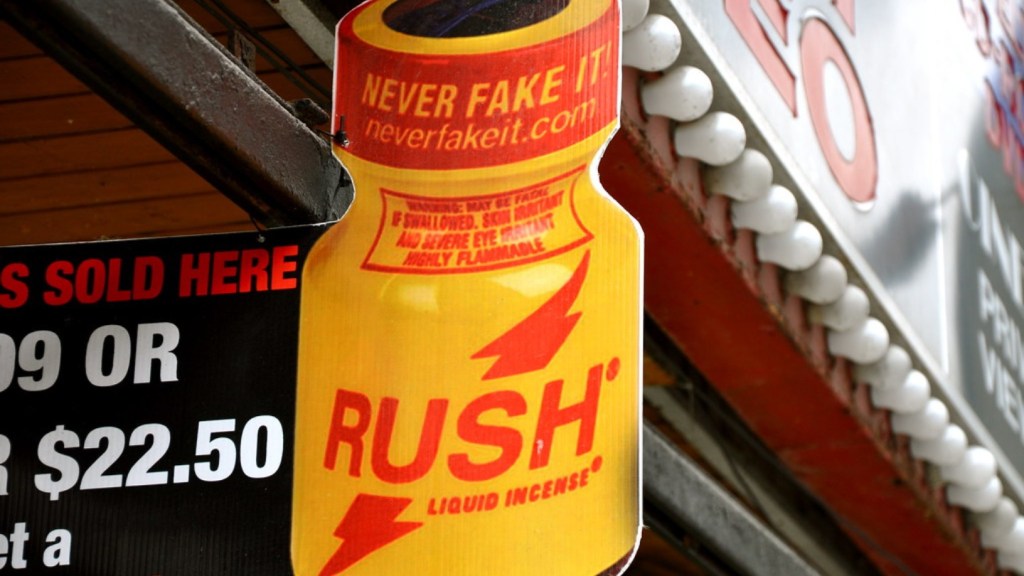It’s been a little over a year since the Australian government announced their plans to outlaw amyl. A proposal canvassed by the Therapeutic Goods Administration in April 2018 suggested that all alkyl nitrites be elevated to a Schedule 9 Prohibited Substance: a move that would see “poppers”—a relatively innocuous inhalant that’s huffed as a muscle relaxant for the purposes of comfortable anal sex—ranked alongside the likes of heroin, MDMA, and DMT in the eyes of the law.
In the 12 months since then we’ve seen significant kickback from the LGBTQ community, condemnation from a number of medical experts and health advocates over potential homophobic discrimination, and a short term freeze on any legislative changes until the public at large had their say on the matter. Now that long and arduous process seems to have finally come to an end. Yesterday, the government handed down their decision as to whether or not they would be going ahead with the controversial proposal.
Videos by VICE
So here’s the good news: the TGA announced that, due to public demand, they will not be enforcing a blanket ban on poppers. After a series of public consultation sessions, the government decided to significantly walk back that proposal. That’s the good news—and it is good. But it comes with one or two caveats.
As of February 2020, amyl nitrites will be classified as a Schedule 3 substance “when in preparations for human therapeutic use and packaged in containers with child-resistant closures”—meaning you’ll be able to purchase them from behind the counter at a pharmacist, as long as they have appropriate packaging. Isoamyl nitrite, butyl nitrite, isobutyl nitrite, and octyl nitrite will remain as Schedule 4—meaning they’ll effectively be off limits to those who don’t have a prescription—while isopropyl nitrite and n-propyl nitrite, the chemicals most heavily associated with health risks such as retinal damage, will be reclassified as Schedule 10 and prohibited from sale, supply, and use.
In short, this means that people who use amyl nitrite for sexual and recreational purposes should soon be able to acquire the substance with reasonably little difficulty. Once poppers start showing up in pharmacies, rather than just sex shops, it may well be easier than ever to get your hands on a bottle. The problem is that there are currently no products on the market in Australia that would qualify as “pharmaceutical”—and so although the new laws are set to be rolled out in February, it may well be another few years before users are able to access over-the-counter amyl.
“This is a reasonably good outcome, but we’re concerned about what this will mean in the next year,” said Simon Ruth, CEO of Thorne Harbour Health. “It may be two years before we see amyl nitrites in the marketplace.”
Until then, Simon speculates that affected communities—notably, large swathes of the LGBTQ community—could fall into a “grey area”, wherein they’re legally allowed to buy and use amyl yet forced to acquire it illegally because there’s no over-the-counter product available.
“We’re now calling on state governments to work with the community to ensure that we don’t see gay men and other men who have sex with men criminalised for possession and use of amyl in the meantime,” he declared.
Nonetheless, we shouldn’t make the perfect the enemy of the good: the TGA’s decision is, overall, a positive outcome, and Simon stresses that it deserves to be acknowledged as such. If nothing else, it’s a heartening example of a community speaking up on an issue that affects them and having their voices heard.
“The fact that we’ve seen Australia turnaround from a decision to ban amyl is actually quite remarkable,” he said. “It’s really a testament to our [LGBTQ] community’s continued legacy of mobilisation and activism. We can’t take that for granted as other parts of the world haven’t been so successful.”
Follow Gavin on Twitter or Instagram
Sign up for our newsletter to get the best of VICE delivered to your inbox daily.
More
From VICE
-

Lettuce (Credit: Sam Silkworth) -

Screenshot: Pokemon Go -

Clara Balzary -

Screenshot: NetEase
